
Disputes in the global, digital and decentralized economy occur very often in areas where they can not be resolved by state courts and existing dispute resolution methods. It is at that moment that Kleros is the best option, since it connects users who need to resolve disputes with juries who have the skills to solve them fairly. Our resolution layer uses block chain technology and shared resource juries to resolve disputes quickly, securely and affordably.
Functioning of Kleros
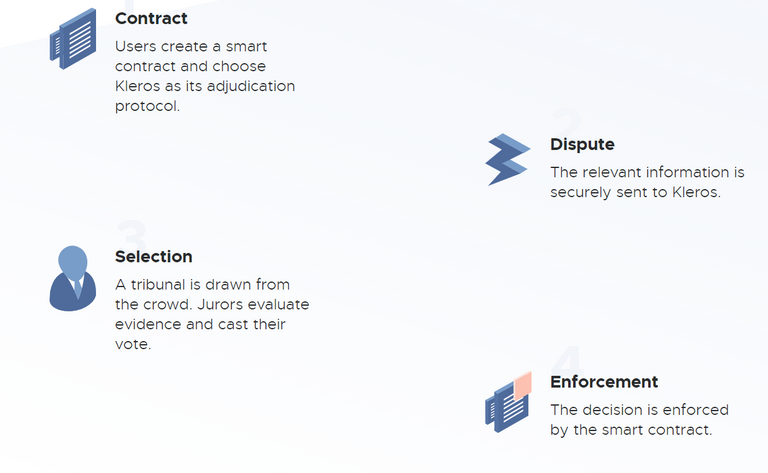
Kleros is a decentralized application that works as a referee of disputes in all types of contracts, from a simple contract to a very complex one. Some disputes are handled through a friendly conversation, while others can be long and laborious for the parties involved. It is based on the theoretical incentives of the games so that the jurors direct the cases correctly. The result is a dispute resolution system that makes final judgments quickly, economically, reliably and on a decentralized path.
Kleros is an optional dispute resolution platform, a network of specialized juries in various categories that are available to resolve disputes. Through the use of intelligent contracts, depositing the funds in question until the selected juries issue a resolution. With Kleros, both parties can be protected in case a contract is breached.
Kleros procedure
The Kleros process is divided into several stages: The contract, Assurance of evidence, Selection of the jury, Analysis, Voting, Appeal, Redistribution of tokens.

Kleros is a voluntary system, which works through a contract between the parties must have a clause that indicates in case of dispute, it will be awarded in Kleros. The contract establishes in which sub-court the arbitration will take place. Some specialize in electronic commerce. Other in finance. Others in insurance contracts.

The process begins when at least one of the parties believes there was a breach of contract. When this happens, the contract in digital format and the relevant tests are sent to Kleros with cryptographic security. The type of evidence will depend on the dispute in question. In a dispute in an online games where one party accuses the other of cheating, the evidence could be a recording of the game. In a dispute over car accident insurance, the evidence could be the insurance contract and the photos of the crashed vehicle.
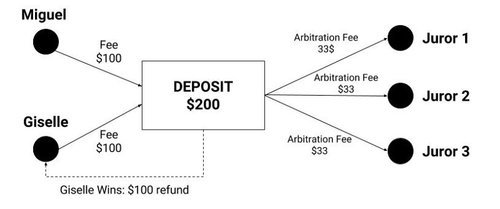
The selection of the jury is based on two elements: self-nomination of candidates and lottery. To avoid retaliation and intimidation, juries are not required to provide proof of identity. Anyone can apply as a jury candidate in a sub court depositing a token called pinakion (PNK). This represents the possibility of being chosen as a juror in a dispute. The greater the amount of tokens activated by a user, the greater the probability that he will be chosen as a jury. The selection is made randomly among all users who activated their token in a specific sub-section.
The mechanism is extremely resistant to attacks and tampering attempts. The candidates are nominated in a sub-court, not in individual cases. Each sub-section has multiple simultaneous cases. A lottery mechanism assigns the candidate to a specific case. This form of selection acts as protection against bribes. From the point of view of the attacker, a very important part of the money would have to be used to bribe juries that would not even be part of the court. Once the juries have been chosen, the pinakion are frozen. They will only be released once the court has delivered its verdict.
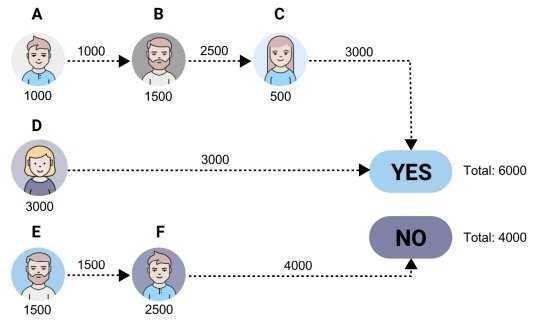
Users drawn as jurors receive access to the evidence. Now, each one has to analyze it and give its verdict. Different sub-courts have different parameters regarding the procedure and the time that the juries will have to make a decision, the complexity of the voting options and the possibility of communicating with the parties. In the initial stage, Kleros will concentrate on simple disputes, between two parties and with two options. As technology is perfected, the system will be able to adjudicate increasingly complex disputes.
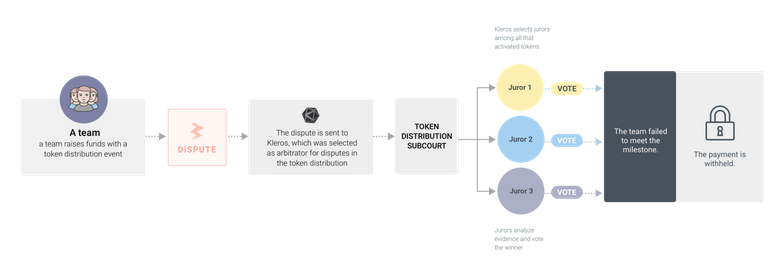
Once the evidence has been processed, the jurors vote for one of the options. They are required to provide a justification for their decision. The winning option is the median vote of the jurors. This option gives a consensus result and is robust to strategic voting.
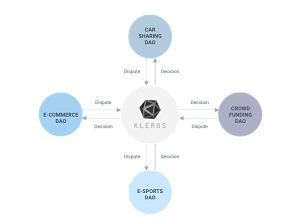
In case a party is not satisfied with the decision, it always has the possibility to appeal. Sentences can be appealed multiple times. In each round, a new court is formed with twice as many jurors as in the previous round plus one. The appealing party will have to pay the justice fee. If you lose again, you can appeal again, always taking charge of the costs of the process.
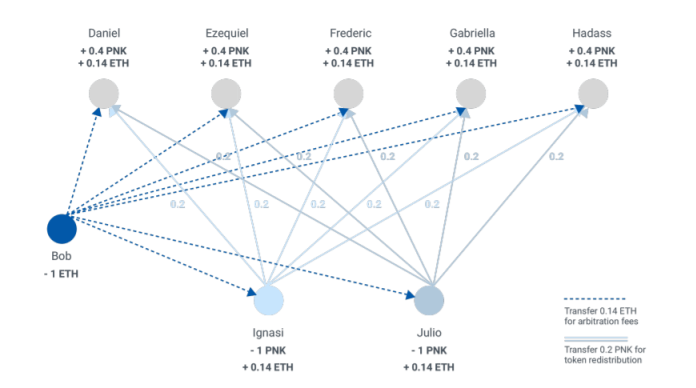
Once the jury reaches a final decision, the pinakions are thawed and redistributed among the jurors. Each jury will win or lose tokens based on the coherence of their vote with that of the majority. The redistribution is based on the logic of the focal point or Schelling Point, a concept developed by Thomas Schelling, expert in game theory and Nobel Prize winner. Economy 2005. Schelling called focal point to a solution that agents tend to use to coordinate their behavior in the absence of communication or when the parties do not trust each other.
If the jurors were correctly selected, if they had access to the same evidence and if they had the right incentives, the concept of a focal point holds that they should reach a similar verdict on the same case. According to this concept, juries who voted inconsistently with the rest were not properly qualified (they applied in a sub-court for which they did not have sufficient knowledge) or did not conduct an appropriate analysis (perhaps, they voted too quickly, only to collect their fee). Jury incentives come from two sources: 1) Arbitration fees, which all juries receive equally, as compensation for the time spent analyzing evidence and voting; 2) The redistribution of pinakion from the juries that voted incoherently to those who voted consistently.
Work team
kleros2018
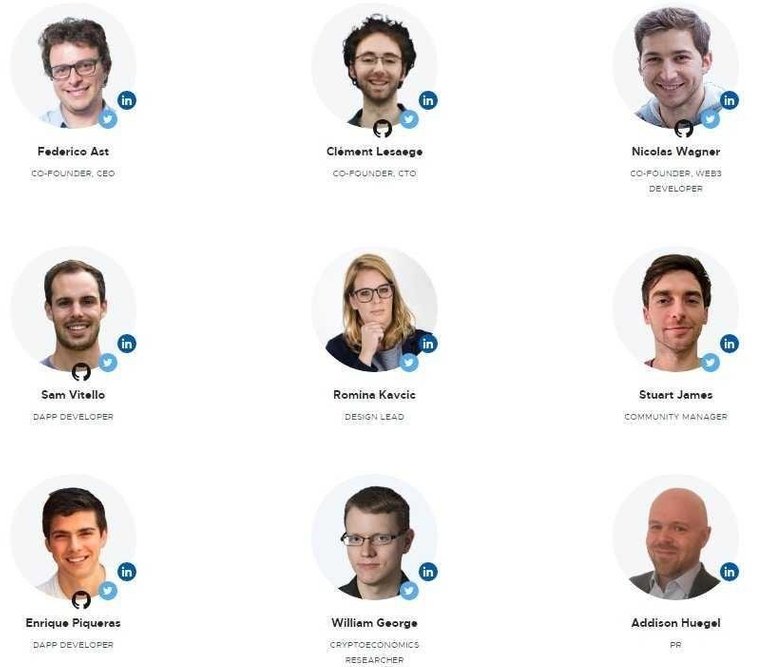
Hi! I am a robot. I just upvoted you! I found similar content that readers might be interested in:
https://medium.com/kleros/kleros-a-decentralized-justice-protocol-for-the-internet-38d596a6300d
Sponsored Writing Contest!
This post has been submitted for the @OriginalWorks You can also follow @contestbot to be notified of future contests!